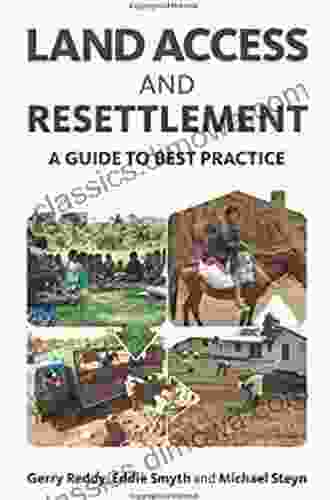Unlocking the Potential: Land Access and Resettlement for Sustainable Development

Land access and resettlement are fundamental pillars of sustainable development. They play a vital role in reducing poverty, promoting food security, fostering economic growth, and safeguarding the environment. This article examines the intricate relationship between land tenure, community empowerment, and environmental protection, highlighting the transformative power of well-planned and equitable land access and resettlement interventions.
5 out of 5
| Language | : | English |
| File size | : | 11642 KB |
| Text-to-Speech | : | Enabled |
| Screen Reader | : | Supported |
| Enhanced typesetting | : | Enabled |
| Word Wise | : | Enabled |
| Print length | : | 426 pages |
Land Tenure and Sustainable Development
Secure land tenure is essential for sustainable development. It provides individuals and communities with the legal right to own, use, and control land, empowering them to make long-term investments in agriculture, housing, and other productive activities.
When people have secure land tenure, they are more likely to:
- Invest in land improvements, such as irrigation systems and soil conservation measures, which increase agricultural productivity and reduce environmental degradation.
- Build permanent homes and establish businesses, creating stable communities and fostering economic growth.
- Protect and manage natural resources, recognizing the long-term benefits of sustainable land use practices.
Community Empowerment
Equitable access to land is crucial for community empowerment. It enables communities to control their own resources, make decisions about land use, and build sustainable livelihoods. This empowerment can contribute to:
- Improved social and economic equality
- Increased participation in decision-making processes
- Reduced conflict and instability
- Enhanced cultural preservation and identity
Environmental Protection
Land access and resettlement can play a significant role in environmental protection. By providing secure land tenure and empowering communities, governments and organizations can encourage the adoption of sustainable land management practices that preserve natural ecosystems and reduce environmental degradation.
Specific environmental benefits of land access and resettlement include:
- Reduced deforestation and forest degradation
- Improved soil conservation and water management
- Increased biodiversity and habitat protection
- Mitigation of climate change through carbon sequestration
Global Best Practices
Around the world, numerous successful examples showcase the transformative impact of land access and resettlement interventions. Here are a few notable best practices:
Brazil's Land Reform Program
Brazil's land reform program, launched in 1995, has redistributed millions of hectares of land to landless families, providing them with secure land tenure and support services. The program has resulted in increased agricultural productivity, reduced poverty, and improved environmental conservation.
Vietnam's Resettlement Program
Vietnam's resettlement program, implemented in the 1980s, relocated millions of people from overcrowded urban areas to rural areas with abundant land resources. The program provided resettling families with land, housing, and agricultural support, enabling them to establish sustainable livelihoods and contribute to national development.
India's Forest Rights Act
India's Forest Rights Act (2006) recognizes the rights of forest-dwelling communities to own, use, and manage forest lands. The Act has empowered these communities, providing them with secure land tenure and allowing them to protect and sustainably manage their traditional forest resources.
Case Studies
In addition to the global best practices mentioned above, let's examine some specific case studies that illustrate the transformative effects of land access and resettlement:
Land Distribution in Mexico
In the early 20th century, Mexico implemented a land redistribution program that transferred millions of hectares of land from large landowners to landless peasants. The program significantly reduced rural poverty and inequality, while also contributing to increased agricultural production and environmental conservation.
Resettlement in Colombia
Colombia's resettlement program, implemented in response to internal displacement caused by armed conflict, has provided land, housing, and economic support to thousands of families. The program has enabled these families to rebuild their lives and participate in the country's peace and development process.
Community Land Trusts in the United States
Community land trusts (CLTs) are non-profit organizations that acquire and hold land in trust for low-income communities. CLTs provide secure land tenure, affordable housing, and community empowerment initiatives. They have been successful in reducing housing costs, preserving affordable communities, and fostering economic development.
Policy Recommendations
Based on the evidence presented in this article, the following policy recommendations can be made to promote sustainable land access and resettlement:
- Establish and strengthen legal frameworks that recognize and protect land rights, particularly for marginalized communities.
- Invest in land tenure security programs that provide legal titles, land registration systems, and dispute resolution mechanisms.
- Foster community participation in land use planning and decision-making processes, empowering communities to shape their own future.
- Provide resettlement and rehabilitation support to communities affected by displacement or natural disasters.
- Promote sustainable land management practices through education, incentives, and technical assistance.
Land access and resettlement are essential elements of sustainable development. By providing secure land tenure, empowering communities, and protecting the environment, they can contribute to poverty reduction, food security, economic growth, and environmental sustainability. The transformative power of well-planned and equitable land access and resettlement interventions should be recognized and leveraged to create a more just and sustainable world for all.
5 out of 5
| Language | : | English |
| File size | : | 11642 KB |
| Text-to-Speech | : | Enabled |
| Screen Reader | : | Supported |
| Enhanced typesetting | : | Enabled |
| Word Wise | : | Enabled |
| Print length | : | 426 pages |
Do you want to contribute by writing guest posts on this blog?
Please contact us and send us a resume of previous articles that you have written.
 Book
Book Novel
Novel Page
Page Chapter
Chapter Text
Text Story
Story Genre
Genre Reader
Reader Library
Library Paperback
Paperback E-book
E-book Magazine
Magazine Newspaper
Newspaper Paragraph
Paragraph Sentence
Sentence Bookmark
Bookmark Shelf
Shelf Glossary
Glossary Bibliography
Bibliography Foreword
Foreword Preface
Preface Synopsis
Synopsis Annotation
Annotation Footnote
Footnote Manuscript
Manuscript Scroll
Scroll Codex
Codex Tome
Tome Bestseller
Bestseller Classics
Classics Library card
Library card Narrative
Narrative Biography
Biography Autobiography
Autobiography Memoir
Memoir Reference
Reference Encyclopedia
Encyclopedia Sung W Lee
Sung W Lee Barbara Freedman De Vito
Barbara Freedman De Vito Constance Reid
Constance Reid Tuan Anh Nguyen
Tuan Anh Nguyen Barry Buggles
Barry Buggles Jennifer Chambliss Bertman
Jennifer Chambliss Bertman Babs Omotowa
Babs Omotowa Babak Akhgar
Babak Akhgar David J Leonard
David J Leonard Ashley Hodges Bazer
Ashley Hodges Bazer August Farrow
August Farrow Barbara Morgenroth
Barbara Morgenroth Mr Gss
Mr Gss Audrey Terras
Audrey Terras Jody Hedlund
Jody Hedlund Stanley J Feldman
Stanley J Feldman Jason Bloomquist
Jason Bloomquist Liliana Buchtik
Liliana Buchtik Kathryn Payne Olson
Kathryn Payne Olson Lars Horn
Lars Horn
Light bulbAdvertise smarter! Our strategic ad space ensures maximum exposure. Reserve your spot today!

 Ryan FosterPanda Bears for Kids: An Enchanting Journey into the World of Black and White...
Ryan FosterPanda Bears for Kids: An Enchanting Journey into the World of Black and White...
 Brian BellUnlock the Vibrant Tapestry of Spanish in Latin America: An Essential Phrase...
Brian BellUnlock the Vibrant Tapestry of Spanish in Latin America: An Essential Phrase... Damon HayesFollow ·12.6k
Damon HayesFollow ·12.6k Bradley DixonFollow ·3.5k
Bradley DixonFollow ·3.5k Corey HayesFollow ·17.5k
Corey HayesFollow ·17.5k Zachary CoxFollow ·12k
Zachary CoxFollow ·12k Jake CarterFollow ·5k
Jake CarterFollow ·5k Eric NelsonFollow ·5.7k
Eric NelsonFollow ·5.7k Tyler NelsonFollow ·18k
Tyler NelsonFollow ·18k Ray BlairFollow ·16.6k
Ray BlairFollow ·16.6k

 Marcus Bell
Marcus BellHigh Lonesome: A Literary Journey into the Heart of the...
<p>Hannah weaves a intricate...

 Gabriel Hayes
Gabriel HayesRediscover Gideon Green's Timeless Adventures in "Gideon...
Embark on an Extraordinary Journey with...

 Samuel Taylor Coleridge
Samuel Taylor ColeridgeEscape to a Literary Haven: Discover the Enchanting World...
Embark on an Extraordinary Literary...
5 out of 5
| Language | : | English |
| File size | : | 11642 KB |
| Text-to-Speech | : | Enabled |
| Screen Reader | : | Supported |
| Enhanced typesetting | : | Enabled |
| Word Wise | : | Enabled |
| Print length | : | 426 pages |














